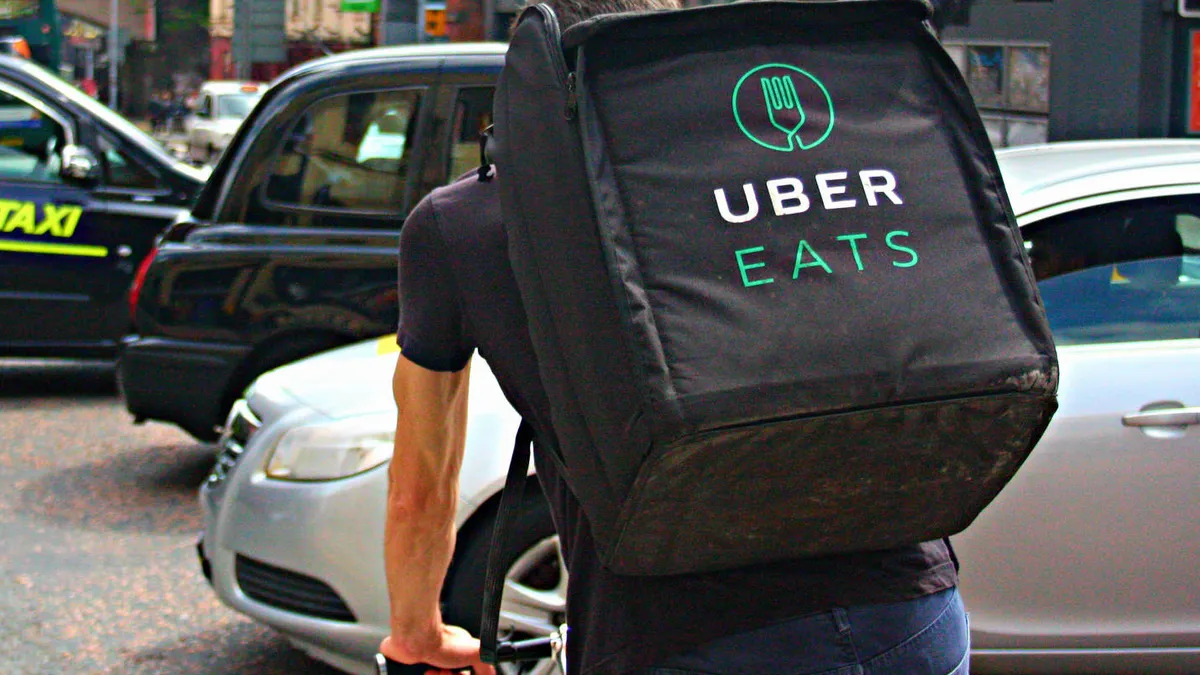Dive Brief:
- San Francisco-based Uber has taken the next step in developing its grocery delivery business, announcing it will open an engineering hub in Toronto that will play "a pivotal role" in the still-developing effort, including product development and go-to-market strategy, according to a notice sent to Grocery Dive.
- Uber hasn't released details on its grocery platform, including a timeline, but CEO Dara Khosrowshahi has said the company wants to enter the growing delivery space, which complements its Uber Eats restaurant delivery business. The company posted a job listing in November for a "head of grocery" position at the Toronto office, and described the new platform as “a brand new product offering, which will fundamentally evolve how people purchase their groceries.”
- The Toronto office, which is set to open in the coming weeks, will be home to 200 Uber employees and expects that number to grow to 400 in the coming years. The hub will also include teams developing Uber's health and financial technology products. This will be Uber's eleventh engineering hub worldwide.
Dive Insight:
An Uber spokesman told Grocery Dive the company plans to continue building its grocery delivery team in Toronto over the coming months. Site lead Kare Kjelstrom also confirmed to the Toronto Star that Uber has hired its head of grocery, who will be located at the new office, but declined to provide details.
“We're just in the process of building that grocery team now — a process that will continue after existing employees move into the new office in the coming weeks,” Josh McConnell, a representative with Uber told Grocery Dive in an email. “As our plans for Grocery and its team take shape, we'll have more to share in the coming months.”
Uber has shown interest in the grocery business for some time now. Last October, the company’s CEO Dara Khosrowshahi said Uber plans to build onto its Uber Eats restaurant delivery platform by moving into grocery delivery. The company also made an ill-fated foray into the space with a platform called Rush that delivered other goods like clothes and flowers, as well. Walmart shut down a partnership with Rush last year, and Uber shuttered the program shortly after, according to Reuters.
The news that Uber is making a renewed push in grocery delivery certainly doesn't come as a shock, as competitors like Instacart and Shipt as well as other restaurant delivery platforms like DoorDash have moved into the grocery business. It's unclear how Uber will attack the opportunity, though. Will it provide end-to-end service similar to Instacart and Shipt or will it just handle the delivery portion, as DoorDash does? Will it stock its own product assortment or serve just as a plug-in for retailers?
However the company's offering unfolds, it has the brand recognition, tech infrastructure and network of thousands of drivers to potentially be a major player in grocery e-commerce.
Considering Uber Eats first launched in Toronto, the city is a natural choice for its grocery delivery development efforts. Uber Eats has quickly become a major food delivery platform, with revenue that grew 149% to $1.5 billion in 2018, about 13% of its total revenue, according to Uber's recent IPO filing.
However, the profitability of that platform remains in question. Company wide, Uber had about $3 billion in operating loss last year, and its recent IPO is now considered a flop, with the stock trading below its $45 opening price. In its S-1 filing, Uber disclosed that it may never achieve profitability because operating costs will continue to increase.
The economics of grocery delivery are very difficult, with labor, fuel and other expenses contending with the need to offer competitive fees for customers. But demand is growing, with online sales set to hit nearly $20 billion this year, according to eMarketer, and as much as $100 billion in the next few years.













